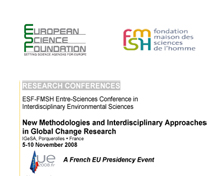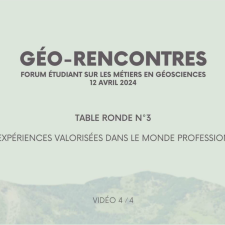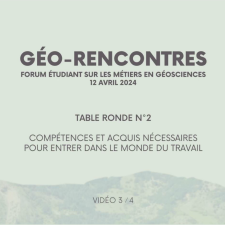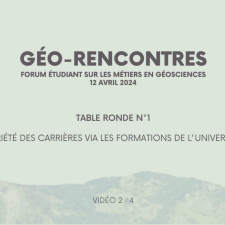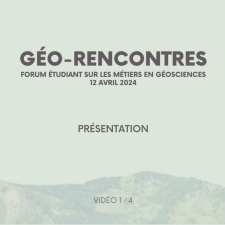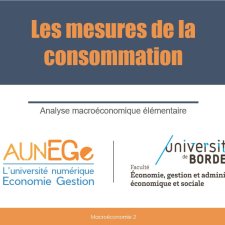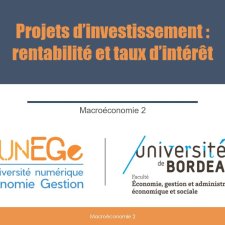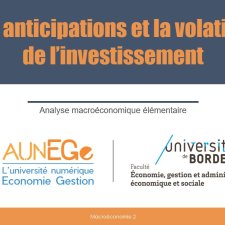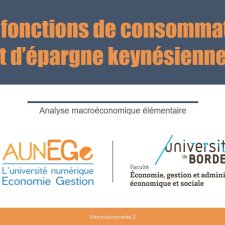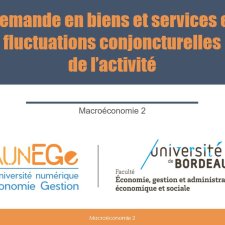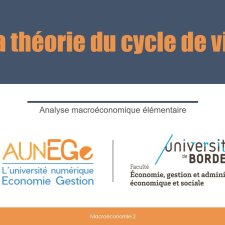Notice
IPCC Working Group II
- document 1 document 2 document 3
- niveau 1 niveau 2 niveau 3
Descriptif
The European Science Foundation (ESF) and the French Foundation of the Maison des Sciences de l’Homme (FMSH) (within the Entre-Sciences programme) have agreed to jointly develop a new conference series in environmental sciences; an effort to actively foster exchanges between scientists working in the humanities and social sciences and their colleagues in the life and natural sciences.
This interdisciplinary conference present the new advances in the modelling of the Global Change that combines Geosciences and Economics, with a perspective view from history - given the novelty of their interrelations – and from political science – given the impact of the model outputs in the public sphere. The conference gather together speakers and attendees from Europe, United States and Asia.
The conference focuses on new advances in the construction of models of the global change, in Earth sciences and in Economics. Given the issues at stake with Global Warning in terms of impacts and risks, these multidisciplinary approaches are necessarily placed in a public policy perspective, a case apparently unique in the history of science. Chaired by Joël Guiot, climatologist at the European Centre for the Research and Teaching of the Geosciences of the Environment (CEREGE, Aix-en-Provence) and Sylvie Thoron, economist at the Aix-Marseille Research Group in Quantitative Economy (GREQAM, Marseille), the conference aims at generating intense discussions between scientists coming from various disciplinary horizons, by emphasizing the need for integrative approaches when thinking of our future in terms of sustainable development.
>> More information on the web site site web Entre-Sciences Programme.
Intervention / Responsable scientifique
Dans la même collection
-
Holocene Climatic Changes and Their Effect on Morphodynamics and Sedimentation in Campania
AmatoVincenzoHigh-resolution paleoclimatic studies (e.g. 18O, 13C, CH4, MS, ect) provide 38 detailed reconstructions of the Holocene climatic variability, but they don’t are unable to provide direct informations
-
Debate
JoussaumeSylviePlantonSergeGonzales RoucoJesus FelipeGoosseHughesReissellAnniBrasseurGuyThe European Science Foundation (ESF) and the French Foundation of the Maison des Sciences de l’Homme (FMSH) (within the Entre-Sciences programme) have agreed to jointly develop a new conference
-
Linking Adaptation and Mitigation for Climate Risk Reduction
ShogrenJason F.How people privately and collectively adapt to climate risk can affect the costs and benefits of public mitigation policy (e.g., Kyoto); an obvious point often neglected in actual policy making.
-
Social Impact of global Environmental Change on Farming Communities on the Ogoli River Bank in Otuk…
Anjeinu AbuGodwinOne of the manifestations of the global change in this study area is a marked reduction in the duration and amount of rainfall. This adversely affects the volume of the head waters that ultimately
-
How to Foster the Economic and Societal Technical Solutions?
CallonecGaëlThe presentation will focus on the interplay between economic scenarios (based on energy demand and CO2 emission reduction) with long run-public policies. The French case will be discussed in more
-
Debate
DjédjéOkoubi Franck DidierMillnerAntonyRaj AryalKomalFragnièreAugustinThe European Science Foundation (ESF) and the French Foundation of the Maison des Sciences de l’Homme (FMSH) (within the Entre-Sciences programme) have agreed to jointly develop a new conference
-
Conference Opening
GuiotJoëlLauberVolkmarThe European Science Foundation (ESF) and the French Foundation of the Maison des Sciences de l’Homme (FMSH) (within the Entre-Sciences programme) have agreed to jointly develop a new conference
-
From Climate Models to Earth System Models
BrasseurGuyComplex climate models that describe the evolution of the coupled ocean atmosphere cryosphere system are gradually extended to “non physical” components of the earth system, and account for land
-
Are European Ecosystems Vulnerable to Climate Change
CramerWolfgangThe relatively simple question posed by this title turns out to be complicated in its implementation, for a number of reasons: First, ecosystems have changed in response to changing climate throughout
-
The Impacts of Climate Change on Continental Ecosystems
SeguinBernardClimate change will deeply modify the ecophysiological functioningof plants, by creating a set of conditions which could be more favourable (in the sense of biomass production) or not. Among the first
-
The Economics of the Climate/Development of the Gordian Knot; Beyond a Sound Pessimism
HourcadeJean-CharlesWe will first suggest that costs of meeting ambitious climate targets capable to stabilize global warming below 2°C or 3°C temperature increase have been underestimated so far. The first reason is the
-
Debate
CallonecGaëlDupuisJohannThoronSylvieThe European Science Foundation (ESF) and the French Foundation of the Maison des Sciences de l’Homme (FMSH) (within the Entre-Sciences programme) have agreed to jointly develop a new conference
Avec les mêmes intervenants et intervenantes
-
Round Table
JoussaumeSylvieChanzyAndréSomervilleRichardDuvalRomainThe European Science Foundation (ESF) and the French Foundation of the Maison des Sciences de l’Homme (FMSH) (within the Entre-Sciences programme) have agreed to jointly develop a new conference
Sur le même thème
-
Géo-Rencontres 2024 / Les expériences valorisées dans le monde professionnel
LilloEmmaAraujoJulieHuartFlorianDubreuRomainBuquetDamienChazalLauraBorieMarianeForum sur les métiers en géosciences organisé par les étudiants du CMI Ingénierie Géologique et Civile, Université de Bordeaux, 12 avril 2024
-
Géo-Rencontres 2024 / Compétences et acquis nécessaires pour entrer dans le monde du travail
BrinonJulietteAmoleFili-FenuaPretouFrédéricCampetHugoLiébauxAlbinDe AlemeidaMarie-LouPoirierAymericDufrenoyAudreyForum sur les métiers en géosciences organisé par les étudiants du CMI Ingénierie Géologique et Civile, Université de Bordeaux, 12 avril 2024
-
Géo-Rencontres 2024 / Variété des carrières via les formations de l'université
InguimbertDianeLacazeRomaneLemaitreLaurieChazalLauraMontjeanPascalPoudevigneJacquesPortefaixFrédéricForum sur les métiers en géosciences organisé par les étudiants du CMI Ingénierie Géologique et Civile, Université de Bordeaux, 12 avril 2024
-
Géo-Rencontres 2024 / Présentation
LatasteJean-FrançoisLavieThéoForum sur les métiers en géosciences organisé par les étudiants du CMI Ingénierie Géologique et Civile, Université de Bordeaux, 12 avril 2024
-
Tokyo, plus grande « ville » au monde : aménager et gouverner la démesure
Languillon-AusselRaphaëlAvec ses quelques trente-cinq millions d’habitants, Tokyo est la « ville » la plus peuplée au monde, et l’une des métropoles les plus riches. Cette présentation vise à décrire, analyser et expliquer,
-
-
Projet d'investissement : rentabilité et taux d'intérêt
Maveyraud-TricoireSamuelProjet d'investissement : rentabilité et taux d'intérêt
-
Les anticipations et la volatilité de l'investissement
Maveyraud-TricoireSamuelles anticipations et la volatilité de l'investissement
-
Les fonctions de consommation et d’épargne keynésiennes
Maveyraud-TricoireSamuelLes fonctions de consommation et d’épargne keynésiennes
-
La détermination du PIB à court terme
Maveyraud-TricoireSamuelLa détermination du PIB à court terme
-
Demande en biens et services et fluctuations conjoncturelles
Maveyraud-TricoireSamuelDemande en biens et services et fluctuations conjoncturelles
-


